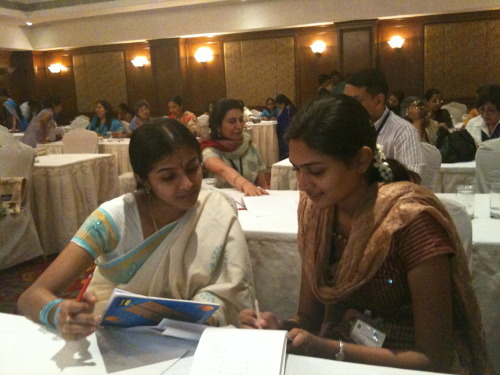My trip to common ground
 Thursday, April 22, 2010 at 11:04PM
Thursday, April 22, 2010 at 11:04PM The act of finding common ground, I've decided, is a bit like trying to create a venn diagram. I'm one circle. You're another circle, and the challenge is to find out where we overlap.
I've spend the last week traveling back and forth across Arkansas, meeting with coaches all over the state. I've driven, I figure over 700 miles, seen a lot of the state, and met many wonderful people. Travel like this, it turns out, is a great opportunity to try out finding common ground. I want to share three experiences I've had this week as I've tried to create venn diagrams for myself and others.
Experience #1. I stayed over night in a wonderful bed and breakfast the Edwardian Inn in Helena. Over breakfast, before I headed to the workshop site, kind of sleepy and lost in my coffee, eggs, and internet, I suddenly remembered our common ground challenge. I decided to search for some common ground with the host of the inn, and I asked him about the BB King poster he had posted in a corner of the hotel. That simple question led to a lively conversation about the musical history of Helena. It turns out that the town has an incredible history. The famous King Biscuit Flower Hour radio show had its start in Helena. The awesome Levon Helm, from the The Band, grew up in Helena. And the "crossroads"made famous by Robert Johnson were only about 30 miles from Helena in Clarksdale, Mississippi. These are just some of the things I heard. There were other stories about Conway Twitty and Bessie Smith, and the Helena Blues Festival. I loved the conversation, and I now have a much deeper appreciation of Helena, and I feel I got to know a really nice fellow. If you go to the Edwardian Inn, be sure to say hi for me.
Experience # 2. Driving from Little Rock to Fort Smith, I stopped at a gas station off the road. The two people running the station seemed to be just putting in time. I noticed, however, that they had accents that sounded a bit like they were from India, and it turned out I was right. I shared that I had just been there, and we had a great, lively conversation about the food, the scent, the traffic, and the sense of harmony I felt was central to the Indian way of life. In a flash, it felt like we were friends. I felt a real connection with them, and we all had fun. Finding common ground was joyous; it brought me closer to two nice people, and when we found that common ground we were all happier and more energized. I really believe this is our natural state--happy, connected, and enjoying each other's company. Our communication challenge is all about getting us back to that state.
Experience # 3. I put a post on twitter from a hotel in Magnolia, the first night of my trip. The comment linked to a video that recorded a lot of racist statements by a certain group. Someone wrote back within minutes to say she didn't see any racism. Well this was a time when I wanted to be respectful, but I also knew I had to say we were different. I wrote back, as nicely as I could, that if she didn't see racism there, she really needed to do some thinking. Finding common ground, then, has its limits. What I learned in experience # 3 is that when we find the overlapping part of our circle, there is still a lot that doesn't overlap. That difference means we see things differently, and sometimes we also need to share our different perspectives. We should never back away from speaking the truth. The thing is, if we find common ground, there is a better chance that others will hear us.
What have you learned this week? We'd love to hear.


